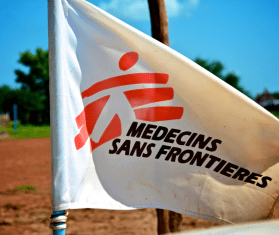Adré, Chad, October 19, 2023—Since fighting erupted in Sudan in April, about 430,000 refugees have fled to Chad, and more are expected to arrive in the coming months. Health conditions are precarious for the approximately 200,000 refugees now staying in camps in Adré, eastern Chad, due to a lack of water, food, shelter, and sanitation facilities.
Doctors Without Borders/Médecins Sans Frontières (MSF) teams are providing medical care in Adré and responding to critical water needs, but ongoing water scarcity may have disastrous consequences if other organizations do not similarly respond.
"In the refugee camps at Adré, some 200,000 people are receiving just five to six liters of water daily, well below the recommended emergency standard of 20 liters per day," said Christophe Chauliac, MSF project coordinator in Adré. "MSF serves as the primary water provider in the camps, distributing around 600,000 liters daily and covering more than 80 percent of the available water supply for refugees. Despite these efforts, this amount is insufficient, especially in scorching weather. An insufficient water supply hinders basic needs such as washing and cooking, forcing people to turn to unsafe sources and increasing the risk of waterborne diseases such as diarrhea and cholera."
MSF has set up 15 water collection points and dug five borehole wells around the Adré refugee camps, but these provide much less water than is needed. Medical facilities run by MSF and other organizations are already operating at maximum capacity, as they see elevated rates of acute watery diarrhea and other diseases, while there are very limited options for patients requiring medical referrals to hospitals.
Larger-scale outbreaks of waterborne or other infectious diseases in such a densely populated and under-supported refugee setting could have catastrophic consequences.
"International nongovernmental organizations and donors must act promptly to address this pressing humanitarian crisis by ensuring that people in the camps gain sustainable access to safe drinking water," Chauliac said.




